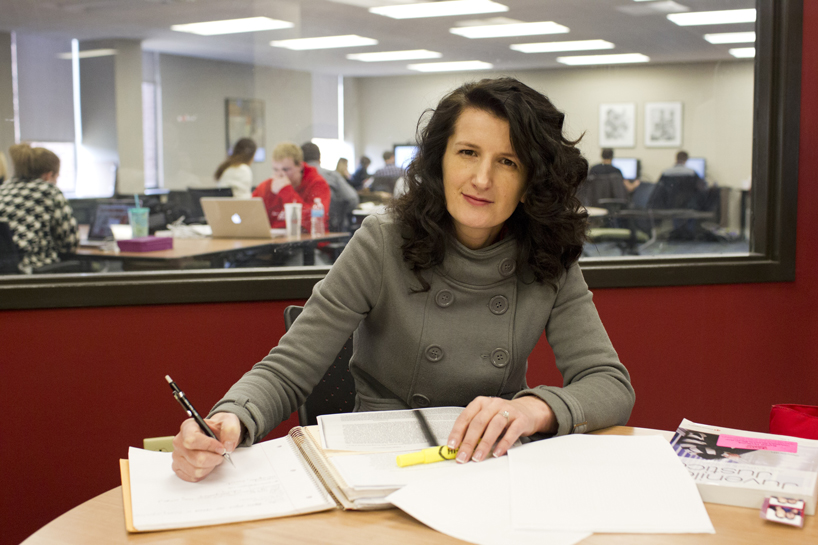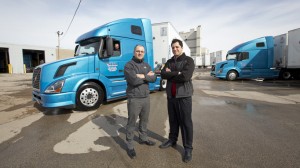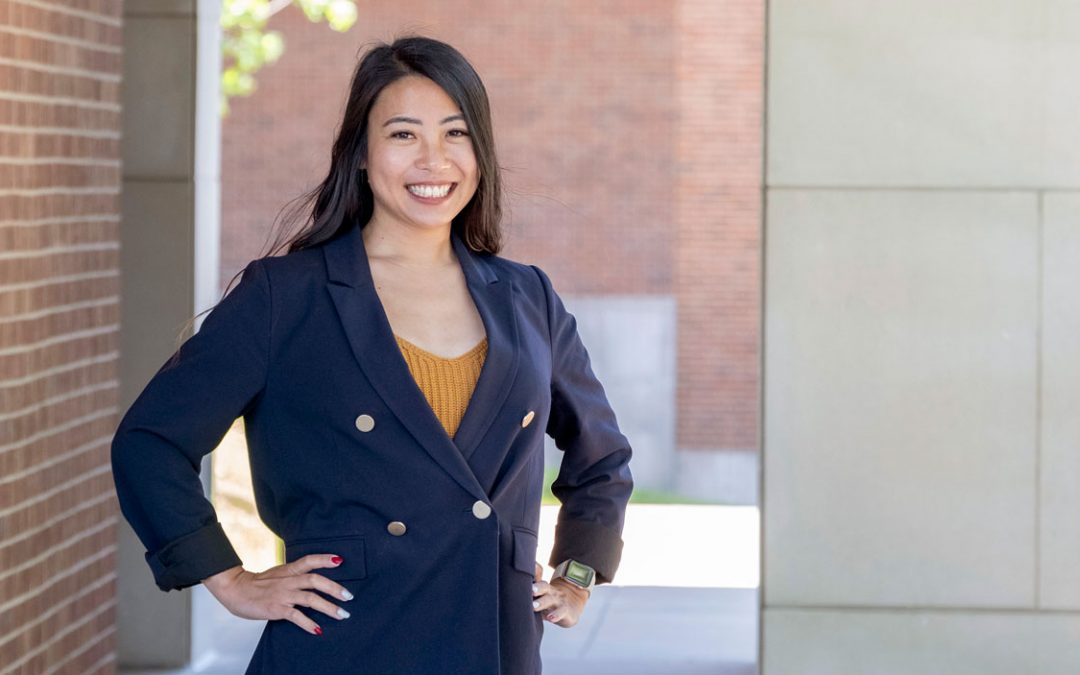
Kadika Pajazetovic will graduate in May with a degree in criminology and criminal justice. (Photo by August Jennewein.)
When drivers pass a semi on the highway, they don’t usually think much about the story behind the truck. When it’s a truck from Vega Transport, they’re passing not just a truck, but the product of a journey that includes war, loss, survival, resettlement and rebuilding.
Vega Transport is the product of Irfan and Nick Sinanovic, who started the company while students at the University of Missouri– St. Louis. In the ‘90s, the Sinanovic brothers were part of a wave that gave new starts to roughly 60,000 Bosnians. Most came through refugee resettlement programs as a result of the Bosnian War that took place from 1992 through 1995. In return, St. Louis’ Bosnian residents have been credited with creating a strong community and successful businesses while reviving several St. Louis neighborhoods.
“The St. Louis Bosnian community is not getting started anymore,” Irfan Sinanovic says. “Now we’re established.”
Many members of the St. Louis Bosnian community have found an educational home at UMSL, although the university does not track students who are of Bosnian heritage. Stephanie DiPietro, assistant professor of criminology and criminal justice, has studied the Bosnian community and says the Bosnian students she has worked with exhibit an uncommon resilience.
Driving down Gravois Avenue in South St. Louis toward the landmark Bevo Mill, the streets are lined with restaurants, offices and other businesses bearing Bosnian names, while neighborhoods are lined with well-tended homes and yards.
“These people lived through incredible hardships and yet they’ve thrived in ways that not many other immigrant or refugee groups have,” says DiPietro, who is currently conducting research in Bosnia.
Kadika Pajazetovic is one of DiPietro’s students in the criminology department and feels she has more opportunities in the U.S. as a woman than she would in her home country. Pajazetovic moved to St. Louis in 1998 with her then-husband and infant son. She was initially homesick in her first apartment near Jefferson Avenue and Cherokee Street. Her new country felt isolating and strange, but after learning English, she became involved in the neighborhood and attended community college classes before starting at UMSL.
“I feel St. Louis is my home,” she says. “I like to visit my mom and my family, but after a couple of weeks I’m ready to come back.”
Today, she is most interested in working with women and children when she graduates in May. Her desire to work in law enforcement stretches back to her childhood during the chaos of the Bosnian War.
“You could just see the good in human beings,” Pajazetovic says. “My life was saved by good people, so I want to give something back.”
UMSL’s community of Bosnian students like Pajazetovic is small but tightknit, says Adnan Smajic, a graduate student in psychology. Even though he works with Bosnian students and supports Bosnia’s soccer team, he bears the markings of an American upbringing. His family was able to leave Bosnia early in the war, when he was a baby, because his father was working in Germany at the time.
They moved to St. Louis in 1997 when Smajic was a second-grader speaking no English. By high school, he had assimilated enough to consider himself class clown.
Today, he is sandwiched between his Bosnian heritage and his American present. He looks forward to teaching his son, due in June, about the history and heritage he and his wife share. But the U.S. is home.
“I have an American accent when I speak Bosnian,” Smajic says. “I think it’s important to remember where you’re from but it’s also important to assimilate.”

Brothers Irfan Sinanovic (left) and Nick Sinanovic founded Vega Transport when they were still students at UMSL. Today, the company has a fleet of 50 trucks. (Photo by August Jennewein.)
The Sinanovics have worked hard on their path to assimilation, while continuing to honor their Bosnian heritage. They arrived in St. Louis with their mother in 1999, a year after Pajazetovic. The brothers grew up in Bratunac, an Eastern Bosnia town on the Drina River. Before the war started in 1992, they had a peaceful childhood in a town where their dad was once chief of police and kids spent most of their time playing outside.
Serbian forces took over their town early in the war, so the Sinanovic family fled a few miles away, to Srebenica. As a 13-year-old, Irfan Sinanovic spoke some English and helped the local Doctors Without Borders mission as a translator. In return for his help, the doctor secured spots for Nick and their mother on a United Nations truck that was returning to Tuzla after delivering food to the besieged city. Irfan left about a month later, but their father stayed behind. He was killed in July 1995, during the Srebenica massacre, believed to be the worst act of genocide in Europe since World War II.
The brothers arrived in the U.S. after spending time in Germany. After learning English through classes at the International Institute and Forest Park Community College, the brothers enrolled at UMSL. Nick majored in computer science while Irfan studied engineering, but it was Nick’s part-time job at the commercial drivers license bureau that set their next step in motion. Because the work put him into contact with many Bosnian truck drivers, Nick heard many tales of trucking company employers taking advantage of their employees. That’s where Vega Transport started.
“We put all of our energy into doing the greater good, rather than thinking about negative things,” Nick Sinanovic says.
Vega Transport has 50 trucks that send goods all over the country and is working on doubling its fleet while making it greener. The name of the company comes from a business their father had started before the war. It is a way to honor their father and their past while moving toward the future.
This story was originally published in the spring 2014 issue of UMSL Magazine.















